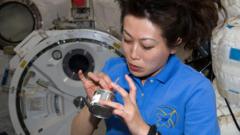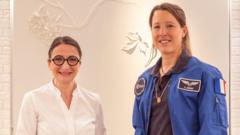In a groundbreaking experiment supported by the European Space Agency (ESA), scientists have embarked on a mission to grow lab-grown food in space. This innovative venture, which launched today, aims to assess the feasibility of cultivating food in low gravity and high-radiation environments such as those found beyond Earth, specifically targeting future missions to the Moon and Mars.
The project seeks to significantly reduce the staggering costs of feeding astronauts, which can reach up to £20,000 per day. This initial experiment will orbit the Earth for approximately three hours before returning to land off the coast of Portugal, providing essential data for future, larger-scale food production systems in space.
Dr. Aqeel Shamsul, founder of Frontier Space, outlines the ambitious future plans: "Our vision is to develop food production facilities in orbit and on the Moon to support a sustained human presence in space." Lab-grown food, which involves cultivating food ingredients like proteins and fats in controlled environments, is already gaining traction on Earth, with lab-grown chicken available in the US and Singapore, and lab-grown steak awaiting approval in the UK and Israel.
For astronauts, the primary incentive for lab-grown nutrition is cost reduction. Current provisions require the constant transport of pre-packaged meals, which are nutritionally limited and often unappetizing. By growing fresh ingredients in space, the reliance on rocket deliveries could lessen significantly, enabling astronauts to enjoy a wider variety of food options.
As researchers develop this concept further, Dr. Shamsul envisions the eventual application of 3D printing technology in space that could create meals according to personal preference and nutritional needs. The setup for the current experiment includes a bioreactor—a compact device designed to produce necessary nutrients through a process known as precision fermentation.
The focus of this mission is to investigate whether cell-based food production can be replicated in space conditions. A specially designed bioreactor has been transported via SpaceX's Falcon 9 rocket as part of ESA's mission, where it will generate conclusive data on the viability of this method in microgravity.
While initial results indicate potential, the physical appearance of the lab-grown food remains a challenge. To advance culinary development, Imperial College's master chef, Jakub Radzikowski, is exploring terrestrial ingredients to create familiar dishes for astronauts. Eventually, with regulatory approval, he hopes to incorporate lab-grown ingredients into cuisines representing diverse global flavors.
Dr. Helen Sharman, the UK’s first astronaut, also tested an early lab-grown dish, praising its flavor. She noted the health benefits lab-grown food could bring to astronauts, particularly given how space travel impacts bodily functions. "Lab-grown options could alleviate dietary issues by ensuring a varied selection of meals," she observed, indicating that nutrition-focused innovations are critical as we plan for humanity’s future off Earth.
As this progress unfolds, the helpful insights gained will not only assist in designing sustainable living systems for outer space but could also shape the future of food production on our home planet. The initiative stands as a promising leap toward interplanetary habitation and self-sustaining ecosystems.
The project seeks to significantly reduce the staggering costs of feeding astronauts, which can reach up to £20,000 per day. This initial experiment will orbit the Earth for approximately three hours before returning to land off the coast of Portugal, providing essential data for future, larger-scale food production systems in space.
Dr. Aqeel Shamsul, founder of Frontier Space, outlines the ambitious future plans: "Our vision is to develop food production facilities in orbit and on the Moon to support a sustained human presence in space." Lab-grown food, which involves cultivating food ingredients like proteins and fats in controlled environments, is already gaining traction on Earth, with lab-grown chicken available in the US and Singapore, and lab-grown steak awaiting approval in the UK and Israel.
For astronauts, the primary incentive for lab-grown nutrition is cost reduction. Current provisions require the constant transport of pre-packaged meals, which are nutritionally limited and often unappetizing. By growing fresh ingredients in space, the reliance on rocket deliveries could lessen significantly, enabling astronauts to enjoy a wider variety of food options.
As researchers develop this concept further, Dr. Shamsul envisions the eventual application of 3D printing technology in space that could create meals according to personal preference and nutritional needs. The setup for the current experiment includes a bioreactor—a compact device designed to produce necessary nutrients through a process known as precision fermentation.
The focus of this mission is to investigate whether cell-based food production can be replicated in space conditions. A specially designed bioreactor has been transported via SpaceX's Falcon 9 rocket as part of ESA's mission, where it will generate conclusive data on the viability of this method in microgravity.
While initial results indicate potential, the physical appearance of the lab-grown food remains a challenge. To advance culinary development, Imperial College's master chef, Jakub Radzikowski, is exploring terrestrial ingredients to create familiar dishes for astronauts. Eventually, with regulatory approval, he hopes to incorporate lab-grown ingredients into cuisines representing diverse global flavors.
Dr. Helen Sharman, the UK’s first astronaut, also tested an early lab-grown dish, praising its flavor. She noted the health benefits lab-grown food could bring to astronauts, particularly given how space travel impacts bodily functions. "Lab-grown options could alleviate dietary issues by ensuring a varied selection of meals," she observed, indicating that nutrition-focused innovations are critical as we plan for humanity’s future off Earth.
As this progress unfolds, the helpful insights gained will not only assist in designing sustainable living systems for outer space but could also shape the future of food production on our home planet. The initiative stands as a promising leap toward interplanetary habitation and self-sustaining ecosystems.

















